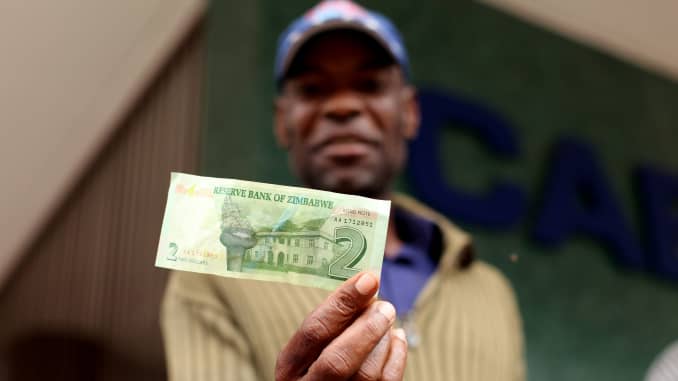(Photo by Drew Angerer/Getty Images)
Another day, another bullshit defamation suit from the Trump campaign. After suing the New York Times last week for accurately pointing out that Don Jr. discussed lifting Russian sanctions with a representative of the Russian government, the Trump campaign has turned its attentions to The Washington Post. Although they had the courtesy to hire Charles Harder, and not Devin Nunes’s nutbag attorney Steven Biss, so #Blessings to all the Trump campaign donors who spared us having to wade through another 58 pages of gobbledygook. Eight pages was plenty, thank you very much!
The Trump campaign alleges that it was grievously defamed by two Opinion columns in the Post last June, which the suit describes creatively as “false reporting.” Both columns refer to an interview by ABC’s George Stephanopoulos last June, during which Trump said he would absolutely accept dirt on his political adversary from a foreign government.
STEPHANOPOULOS: Your campaign this time around, if foreigners, if Russia, if China, if someone else offers you information on opponents, should they accept it or should they call the FBI?
TRUMP: I think maybe you do both. I think you might want to listen, I don’t, there’s nothing wrong with listening. If somebody called from a country, Norway, “We have information on your opponent.” Oh, I think I’d want to hear it.
STEPHANOPOULOS: You want that kind of interference in our elections?
TRUMP: It’s not an interference, they have information. I think I’d take it. If I thought there was something wrong, I’d go maybe to the FBI. If I thought there was something wrong. But when somebody comes up with oppo research, right, that they come up with oppo research. Oh, let’s call the FBI. The FBI doesn’t have enough agents to take care of it, but you go and talk honestly to congressmen, they all do it, they always have. And that’s the way it is. It’s called oppo research.
Worse, he insisted that no one would really call the FBI if a hostile government offered them dirt on an electoral rival.
TRUMP: I’ll tell you what: I’ve seen a lot of things over my life. I don’t think in my whole life I’ve ever called the FBI. In my whole life. You don’t call the FBI. You throw somebody out of your office, you do whatever you–
STEPHANOPOULOS: Al Gore got a stolen briefing book. He called the FBI.
TRUMP: Well, that’s different. A stolen briefing book. This isn’t a (inaudible). This is somebody who said “We have information on your opponent.” Oh, let me call the FBI. Give me a break, life doesn’t work that way.
STEPHANOPOULOS: The FBI Director says that’s what should happen.
TRUMP: The FBI Director is wrong. Because, frankly, it doesn’t happen like that in life.
Which is possibly why the lawsuit left out the hyperlink to ABC’s reporting in its lawsuit. Because Paul Waldman’s editorial says “who knows what sort of aid Russia and North Korea will give to the Trump campaign, now that he has invited them to offer their assistance?” And the Trump suit refers to “the defamatory statement ‘who knows what sort of aid Russia and North Korea will give to the Trump campaign, now that he has invited them to offer their assistance?’” Can you spot the difference?
Moreover, the Trump Campaign indignantly insists that it has repeatedly disavowed foreign election interference, pointing to multiple statements by the White House. Which is, again, not the same thing.
The Trump Campaign claims it was similarly defamed by a second editorial, this one by Greg Sargent, entitled “Trump just invited another Russian attack. Mitch McConnell is making one more likely.” The suit refers to “the defamatory claim that Special Counsel Robert Mueller concluded that the Campaign ‘tried to conspire with’ a ‘sweeping and systematic’ attack by Russia against the 2016 United States presidential election,” and then goes on to insist that the Mueller Report had “concluded there was no conspiracy between the Campaign and the Russian government, and no United States person intentionally coordinated with Russia’s efforts to interfere with the 2016 election.”
First of all, we’ve all seen Don, Jr.’s email welcoming a meeting with a “Russian government attorney” offering dirt on Hillary Clinton, gushing, “If it’s what you say I love it especially later in the summer.” The president’s son was similarly receptive to advances from Wikileaks, which the Mueller Report confirmed was acting as a Russian cutout. So if the Trump campaign didn’t manage to get a conspiracy off the ground, it sure as hell wasn’t for lack of trying.
Second, let’s just check the actual text of Sargent’s piece, shall we?
Mueller also concluded that Trump and/or his campaign eagerly encouraged, tried to conspire with, and happily profited off of those efforts. Yet Mueller did not find sufficient evidence of a criminal conspiracy.
Oh, look, another hyperlink that didn’t make its way into the complaint! And an explicit acknowledgement that Mueller did not find evidence sufficient for a criminal case. Which is not the same as an acquittal — just ask the crowds braying to LOCK HER UP Hillary Clinton, despite multiple investigations establishing she should not be charged for her private email server.
Third of all, this is not a real lawsuit, it’s just a fundraising gimmick.
And fourth of all, this case just got randomly assigned to Judge Ketanji Brown Jackson. LOL, forever.
Okay, enough of this bullshit. We have actual cases at SCOTUS to worry about today.
Donald J. Trump for President v. WP Company, LLC [D.D.C., Case No. 1:20-cv-00626-KBJ]
Transcript: ABC News’ George Stephanopoulos’ exclusive interview with President Trump [ABC]
Trump: I can win reelection with just my base [WaPo]
Trump just invited another Russian attack. Mitch McConnell is making one more likely. [WaPo]
Elizabeth Dye lives in Baltimore where she writes about law and politics.
 Staci Zaretsky is a senior editor at Above the Law, where she’s worked since 2011. She’d love to hear from you, so please feel free to email her with any tips, questions, comments, or critiques. You can follow her on Twitter or connect with her on LinkedIn.
Staci Zaretsky is a senior editor at Above the Law, where she’s worked since 2011. She’d love to hear from you, so please feel free to email her with any tips, questions, comments, or critiques. You can follow her on Twitter or connect with her on LinkedIn.


 Kathryn Rubino is a Senior Editor at Above the Law, and host of
Kathryn Rubino is a Senior Editor at Above the Law, and host of 
 Ellen Trachman is the Managing Attorney of
Ellen Trachman is the Managing Attorney of 











 Jordan Rothman is a partner of
Jordan Rothman is a partner of